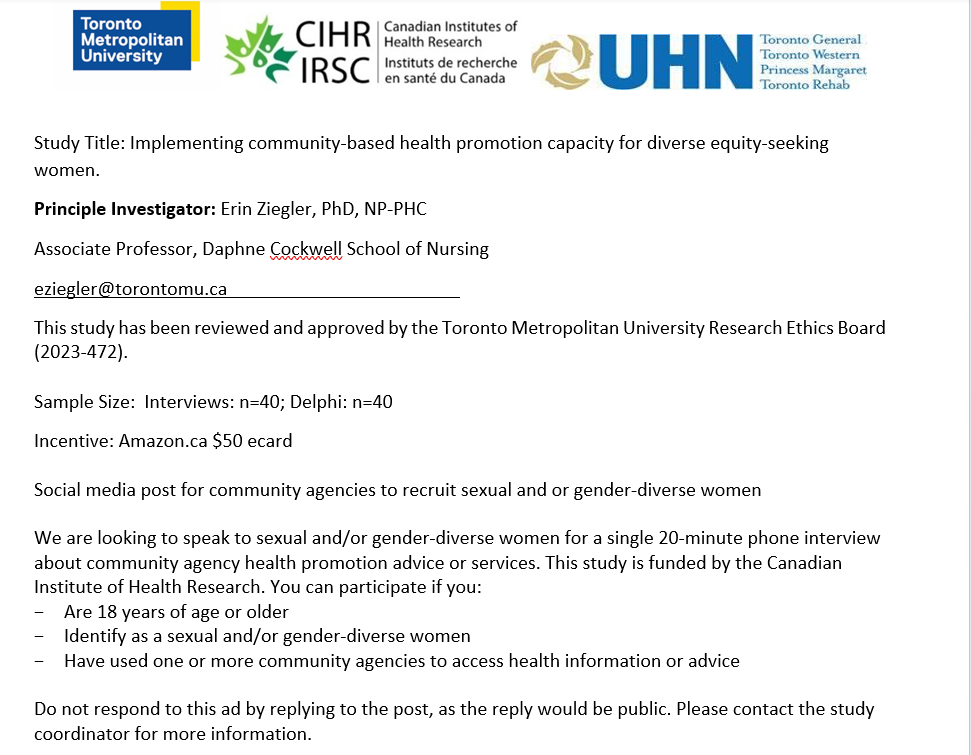
Researcher bios and how their research backgrounds relate to this study
Erin Ziegler (she/her) is a nurse practitioner with a clinical background in primary health care and is the clinical director of a transgender primary care clinic. She is an Associate Professor in the Daphne Cockwell School of Nursing, Ryerson University. Erin completed her PhD in Nursing from McMaster University. Her thesis was entitled: Exploring the Implementation and Delivery of Primary Health Care Services for Transgender Individuals in Ontario. She is a faculty member with the Canadian Centre for Advanced Practice Nursing Research at McMaster University. She has been teaching in the Ontario PHCNP program since 2012. Erin is currently involved in research studies regarding NPs in primary health care and healthcare access for LGBTQ+ individuals.
Purpose of this research project
Sexual and/or gender-diverse women in Canada face inequities in access to and quality of health care to prevent or manage health issues or conditions. Due to poor healthcare experiences, they often seek health advice or services from community agencies because it is culturally safe. The aim of this study is to examine what community agencies need to be able to offer health promotion advice or services to sexual and/or gender-diverse women. This may address gaps in Canada’s overburdened healthcare system and improve the health and wellness of sexual and/or gender-diverse women across Canada. Participants in this study will include up to 40 professional community agency manager, community healthcare worker, health promotion specialist and healthcare decision-maker, and 40 sexual and/ or gender-diverse women.
How this research will help LGBT2SQ people and communities
Strengthening community agencies to provide health promotion advice and services may improve the health and wellness of sexual and gender-diverse women across Canada.
Participants
Inclusion criteria: Participants must identify as a sexual and/or gender-diverse woman. We also want to interview professional including community agency manager, community healthcare worker, health promotion specialist and healthcare decision-maker.
Compensation
Incentive: Amazon.ca $50 ecard for sexual and/ or gender-diverse women
Mitigation measures
There is no potential social risk or financial risk anticipated for health professionals in this study. As participants, the identities of health professionals will be protected. All participants will be assigned an alpha-numeric study number once recruited, and the number will have no identifiable features linking them to the study. A master file that includes all the participant’s personal information and contact information will be kept on a secure network (Google Drive at TMU) that requires a password that is available only to the Principal Investigator (EZ) and Research Assistant. Participants will only be identified by their assigned study number when data is collected. When reporting or publishing the findings from the interviews and surveys, individuals or their organizations will not be identified. In addition, the personal identities of participants will not be disclosed, and no quotes will be linked to them. Same will also applies to the sexual and/or gender-diverse woman. We will ensure that participants’ identities are protected, and any data collected will have participants identified by their assigned study number only. Files will be shared in a secure manner, and they will not be shared with those who are not directly involved in the study. All audio recordings files will be deleted immediately after transcription and verification.
Promoting the Study
The primary investigator E. Ziegler will be sharing the recruitment on her professional LinkedIn page. We will also ask collaborating community agencies to share the recruitment material on their social media pages (i.e.: Facebook or LinkedIn)– it is not an obligation of the collaborating community agencies to share the requirement.
